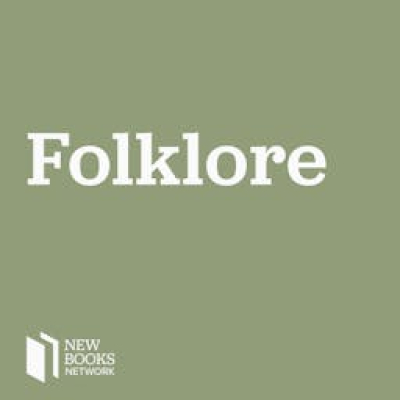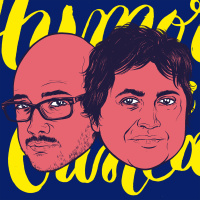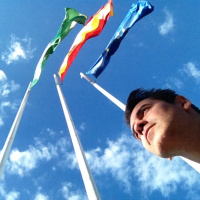Sinopse
Interviews with Scholars of Folklore about their New Books
Episódios
-
Martin Shaw, "Courting the Wild Twin" (Chelsea Green, 2020)
05/05/2020 Duração: 49minToday I interview Martin Shaw. In Shaw’s new book, Courting the Wild Twin (Chelsea Green Publishing, 2020), he writes, “Here’s a secret I don’t share very often. Myths are not only to do with a long time ago. They have a promiscuous, curious, weirdly up-to-date quality. They can’t help but grapple their way into what happened on the way to work this morning, that video that appalled you on YouTube. Well, they are meant to; if they didn’t they would have been forgotten centuries ago.” In our interview, Shaw invites us to consider the power of myth to guide us not only toward new ways of seeing our current moment—one in which we’re witnessing an unprecedented global pandemic—but also new ways of seeing itself. For Shaw, a mythologist who’s designed courses at Stanford University and who directs the Westcountry School of Myth in the U.K, myths reveal unseen possibilities in our own lives and overlooked chances to reunite with our natural world. The old stories can lead us forward if only we learn how to hear the
-
Leslie M. Harris, "Slavery and the University: Histories and Legacies" (U Georgia Press, 2019)
28/04/2020 Duração: 59minSlavery and the University: Histories and Legacies (University of Georgia Press, 2019), edited by Leslie M. Harris, James T. Campbell, and Alfred L. Brophy, is the first edited collection of scholarly essays devoted solely to the histories and legacies of this subject on North American campuses and in their Atlantic contexts. Gathering together contributions from scholars, activists, and administrators, the volume combines two broad bodies of work: (1) historically based interdisciplinary research on the presence of slavery at higher education institutions in terms of the development of proslavery and antislavery thought and the use of slave labor; and (2) analysis on the ways in which the legacies of slavery in institutions of higher education continued in the post–Civil War era to the present day. The collection features broadly themed essays on issues of religion, economy, and the regional slave trade of the Caribbean. It also includes case studies of slavery’s influence on specific institutions, such as P
-
Adam H. Domby, "The False Cause: Fraud, Fabrication, and White Supremacy in Confederate Memory" (U Virginia Press, 2020)
23/04/2020 Duração: 55minAdam H. Domby, an Assistant Professor of History at the University of Charleston, has written a rigorous analysis of American political memory as it connects to the Civil War and long shadow of the Confederacy. The False Cause: Fraud, Fabrication, and White Supremacy in Confederate Memory (University of Virginia Press, 2020) unpacks a variety of threads all connected to the Lost Cause ideology, and all based on falsehoods. These dimensions of the ideology include Domby’s examination of the history of dishonest claims to confederate pensions by white veterans, and also the accusations of fraud associated with claims made by former slaves and free people of color for much smaller pensions. The False Cause digs into the historical claims made about the heroics demonstrated on the battlefield during the Civil War. In this context, The False Cause unpacks the myth that the Confederate army was one of the best ever, and these heroic claims, many of which were made at least forty years after the war itself, are not
-
Magda Teter, "Blood Libel: On the Trail of an Antisemitic Myth" (Harvard UP, 2020)
23/04/2020 Duração: 01h06minThe myth of Jews killing Christian children emerged in 1144 CE, with the death of a boy named William in Norwich, England. Over the course of several centuries, this myth gained traction and became firmly rooted throughout medieval and early modern Europe. In Blood Libel: On the Trail of an Antisemitic Myth (Harvard University Press, 2020), Magda Teter traces the history of this myth and analyzes how accusations of ritual murder have followed Jews from the 12th century to the contemporary period. Magda Teter is Professor of History and Shvidler Chair in Judaic Studies at Fordham University. Lindsey Jackson is a PhD student at Concordia University in Montreal, Canada. Learn more about your ad choices. Visit megaphone.fm/adchoices Support our show by becoming a premium member! https://newbooksnetwork.supportingcast.fm/folkore
-
Matt Cook, "Sleight of Mind: 75 Ingenious Paradoxes in Mathematics, Physics, and Philosophy" (MIT Press, 2020)
30/03/2020 Duração: 51minParadox is a sophisticated kind of magic trick. A magician's purpose is to create the appearance of impossibility, to pull a rabbit from an empty hat. Yet paradox doesn't require tangibles, like rabbits or hats. Paradox works in the abstract, with words and concepts and symbols, to create the illusion of contradiction. There are no contradictions in reality, but there can appear to be. In Sleight of Mind: 75 Ingenious Paradoxes in Mathematics, Physics, and Philosophy (MIT Press, 2020), Matt Cook and a few collaborators dive deeply into more than 75 paradoxes in mathematics, physics, philosophy, and the social sciences. As each paradox is discussed and resolved, Cook helps readers discover the meaning of knowledge and the proper formation of concepts―and how reason can dispel the illusion of contradiction. The journey begins with “a most ingenious paradox” from Gilbert and Sullivan's Pirates of Penzance. Readers will then travel from Ancient Greece to cutting-edge laboratories, encounter infinity and its diffe
-
Lijun Zhang and Ziying You, "Chinese Folklore Studies Today: Discourse and Practice" (Indiana UP, 2020)
27/02/2020 Duração: 01h13minThe discipline of folkloristics in the People’s Republic of China is robust and well-funded. With thousands of scholars across the country, it is surprising then that there is relatively little understanding of the research and contributions of Chinese folklorists to the discipline. This despite the fact that Chinese folklorists are well-acquainted with many of the latest advances in folkloristics research globally. As the first English language attempt to discuss the historical development, current situation, and theoretical contributions of Chinese Folklore studies to the discipline of folklore more broadly, Chinese Folklore Studies Today: Discourse and Practice (Indiana University Press, 2020), edited by Lijun Zhang and Ziying You, attempts to rectify this situation. The volume’s five essays point out different issues relevant to folklore studies, including urban folklore studies, studies of women’s folklore, folksong, myth and belief, and intangible cultural heritage. This unique contribution not only int
-
Phillipa Chong, “Inside the Critics’ Circle: Book Reviewing in Uncertain Times” (Princeton UP, 2020)
25/02/2020 Duração: 42minHow does the world of book reviews work? In Inside the Critics’ Circle: Book Reviewing in Uncertain Times (Princeton University Press, 2020), Phillipa Chong, assistant professor in sociology at McMaster University, provides a unique sociological analysis of how critics confront the different types of uncertainty associated with their practice. The book explores how reviewers get matched to books, the ethics and etiquette of negative reviews and ‘punching up’, along with professional identities and the future of criticism. The book is packed with interview material, coupled with accessible and easy to follow theoretical interventions, creating a text that will be of interest to social sciences, humanities, and general readers alike. Learn more about your ad choices. Visit megaphone.fm/adchoices Support our show by becoming a premium member! https://newbooksnetwork.supportingcast.fm/folkore
-
Charlene Makley, "The Battle for Fortune: State-led Development, Personhood, and Power among Tibetans in China" (Cornell UP, 2018)
10/02/2020 Duração: 01h27minRebgong, in the Northeastern part of the Tibetan Plateau (China’s Qinghai Province), is in the midst of a ‘Battle for Fortune.’ That is, a battle to both accumulate as much fortune, but also a battle to decide which definitions of fortune are going to dominate Tibetan society: a material fortune based in ‘authoritarian capitalism’ or a Buddhist form of ‘counterdevelopment’ based in traditional ideas about language, landscapes, and compassion. In The Battle for Fortune: State-led Development, Personhood, and Power among Tibetans in China (Cornell University Press, 2018), Charlene Makley, Professor of anthropology at Reed College, intermixes these tensions while also exploring her own experience attempting to conduct fieldwork immediately before and after a series of demonstrations rocked Tibet in the lead-up to the 2008 Beijing Olympics. Using a form of multi-sited, ‘dialogic ethnography’ from linguistic anthropology, Charlene Makley considers Tibetans’ encounters with development projects as a historically si
-
K. Linder et al., "Going Alt-Ac: A Guide to Alternative Academic Careers" (Stylus Publishing, 2020)
30/01/2020 Duração: 39minIf you’re a grad student facing the ugly reality of finding a tenure-track job, you could easily be forgiven for thinking about a career change. However, if you’ve spent the last several years working on a PhD, or if you’re a faculty member whose career has basically consisted of higher ed, switching isn’t so easy. PhD holders are mostly trained to work as professors, and making easy connections to other careers is no mean feat. Because the people you know were generally trained to do the same sorts of things, an easy source of advice might not be there for you. Thankfully, for anybody who wishes there was a guidebook that would just break all of this down, that book has now been written. Going Alt-Ac: A Guide to Alternative Academic Careers (Stylus Publishing, 2020) by Kathryn E. Linder, Kevin Kelly, and Thomas J. Tobin offers practical advice and step-by-step instructions on how to decide if you want to leave behind academia and how to start searching for a new career. If a lot of career advice is too vague
-
Eleanor Parker, "Dragon Lords: The History and Legends of Viking England" (Bloomsbury Academic, 2019)
05/12/2019 Duração: 22minFor all of their prominence in the popular imagination today, the historical record of the Viking presence in England is limited, with much of what we know about them dependent upon the literary accounts attached to it. In Dragon Lords: The History and Legends of Viking England (Bloomsbury Academic, 2019), Eleanor Parker deconstructs these accounts to ascertain what they reveal both about the Vikings and their legacy for medieval England. Focusing on the narratives of Ragnar Lothbrok and his sons, Siward, Guy of Warwick, and Havelok, she draws out similarities that deepen our understanding of who they were. By analyzing these stories, she shows how the interpretations of the Danes changed over time, as their evolution into a more hostile and alien presence gave them a more adversarial role in shaping England’s national identity than was the case. Learn more about your ad choices. Visit megaphone.fm/adchoices Support our show by becoming a premium member! https://newbooksnetwork.supportingcast.fm/folkore
-
Alberto Cairo, "How Charts Lie: Getting Smarter about Visual Information" (Norton, 2019)
03/12/2019 Duração: 57minWe’ve all heard that a picture is worth a thousand words, but what if we don’t understand what we’re looking at? Social media has made charts, infographics, and diagrams ubiquitous―and easier to share than ever. We associate charts with science and reason; the flashy visuals are both appealing and persuasive. Pie charts, maps, bar and line graphs, and scatter plots (to name a few) can better inform us, revealing patterns and trends hidden behind the numbers we encounter in our lives. In short, good charts make us smarter―if we know how to read them. However, they can also lead us astray. Charts lie in a variety of ways―displaying incomplete or inaccurate data, suggesting misleading patterns, and concealing uncertainty―or are frequently misunderstood, such as the confusing cone of uncertainty maps shown on TV every hurricane season. To make matters worse, many of us are ill-equipped to interpret the visuals that politicians, journalists, advertisers, and even our employers present each day, enabling bad actors
-
Kathryn Conrad on University Press Publishing
03/11/2019 Duração: 37minAs you may know, university presses publish a lot of good books. In fact, they publish thousands of them every year. They are different from most trade books in that most of them are what you might called "fundamental research." Their authors--dedicated researchers one and all--provide the scholarly stuff upon which many non-fiction trade books are based. So when you are reading, say, a popular history, you are often reading UP books at one remove. Of course, some UP books are also bestsellers, and they are all well written (and, I should say, thoroughly vetted thanks to the peer review system), but the greatest contribution of UPs is to provide a base of fundamental research to the public. And they do a great job of it. How do they do it? Today I talked to Kathryn Conrad, the president of the Association of University Presses, about the work of UPs, the challenges they face, and some terrific new directions they are going. We also talked about why, if you have a scholarly book in progress, you should talk to
-
J. Neuhaus, "Geeky Pedagogy: A Guide for Intellectuals, Introverts, and Nerds Who Want to Be Effective Teachers" (West Virginia UP, 2019)
24/10/2019 Duração: 32minThe things that make people academics -- as deep fascination with some arcane subject, often bordering on obsession, and a comfort with the solitude that developing expertise requires -- do not necessarily make us good teachers. Jessamyn Neuhaus’s Geeky Pedagogy: A Guide for Intellectuals, Introverts, and Nerds Who Want to Be Effective Teachers (West Virginia University Press, 2019) helps us to identify and embrace that geekiness in us and then offers practical, step-by-step guidelines for how to turn it to effective pedagogy. It’s a sharp, slim, and entertaining volume that can make better teachers of us all. Stephen Pimpare is Senior Lecturer in the Politics & Society Program and Faculty Fellow at the Carsey School of Public Policy at the University of New Hampshire. He is the author of The New Victorians (New Press, 2004), A Peoples History of Poverty in America (New Press, 2008), winner of the Michael Harrington Award, and Ghettos, Tramps and Welfare Queens: Down and Out on the Silver Screen (Oxford, 2017
-
Oren Harman, "Evolutions: Fifteen Myths That Explain Our World" (FSG, 2018)
14/10/2019 Duração: 01h06min“There are only two ways to live your life,” said Albert Einstein, “One is as though nothing is a miracle; the other is as though everything is a miracle.” Oren Harman clearly agrees with Einstein’s sentiments. In Evolutions: Fifteen Myths That Explain Our World (Farrar, Straus and Giroux, 2018), Harman takes scientific facts, as we know them today, and weaves them into narratives that have the tone, grace and drama of myth. Harman recognizes that despite the astounding achievements of science we are as humbled as the ancients by the existential mysteries of life. Has science revealed the secrets of fate or immortality? Has it provided protection from jealousy insight into love? Evolutions brings to life the latest scientific thinking on the birth of the universe, and the journey from a single cell all the way to our human minds. Here are the earth and the moon presenting a cosmological view of motherhood, a panicking mitochondrion introducing sex and death to the world, and the loneliness of consciousness em
-
Tim Frandy, "Inari Sami Folklore: Stories from Aanaar" (U Wisconsin Press, 2019)
25/09/2019 Duração: 01h29sInari Sámi Folklore: Stories from Aanaar (University of Wisconsin Press, 2019) is rich multivoiced anthology of folktales, legends, joik songs, proverbs, riddles, and other verbal art, this is the most comprehensive collection of Sámi oral tradition available in English to date. Collected by August V. Koskimies and Toivo I. Itkonen in the 1880s from nearly two dozen storytellers from the arctic Aanaar (Inari) region of northeast Finland, the material reveals a complex web of social relations that existed both inside and far beyond the community. First published in 1918 only in the Aanaar Sámi language and in Finnish, this anthology is now available in a centennial English-language edition for a global readership. Translator Tim Frandy has added biographies of the storytellers, maps and period photos, annotations, and a glossary. In headnotes that contextualize the stories, he explains such underlying themes as Aanaar conflicts with neighboring Sámi and Finnish communities, the collapse of the wild reindeer po
-
S. Ingram, W. G. Mullins, and T. Richardson, "Implied Nowhere: Absence in Folklore Studies" (UP of Mississippi, 2019)
30/07/2019 Duração: 01h11minIn Implied Nowhere: Absence in Folklore Studies (University Press of Mississippi, 2019) authors Shelley Ingram, Willow G. Mullins, and Todd Richardson talk about things folklorists don't usually talk about. They ponder the tacit aspects of folklore and folklore studies, looking into the unarticulated expectations placed upon people whenever they talk about folklore and how those expectations necessarily affect the folklore they are talking about. The book's chapters are wide-ranging in subject and style, yet they all orbit the idea that much of folklore, both as a phenomenon and as a field, hinges upon unspoken or absent assumptions about who people are and what people do. The authors articulate theories and methodologies for making sense of these unexpressed absences, and, in the process, they offer critical new insights into discussions of race, authenticity, community, literature, popular culture, and scholarly authority. Taken as a whole, the book represents a new and challenging way of looking again at t
-
M. D. Foster and J. A. Tolbert, "The Folkloresque: Reframing Folklore in a Popular Culture World" (Utah State UP, 2015)
02/07/2019 Duração: 52minThis volume introduces a new concept to explore the dynamic relationship between folklore and popular culture: the "folkloresque." With "folkloresque," Foster and Tolbert name the product created when popular culture appropriates or reinvents folkloric themes, characters, and images. Such manufactured tropes are traditionally considered outside the purview of academic folklore study, but the folkloresque offers a frame for understanding them that is grounded in the discourse and theory of the discipline. Fantasy fiction, comic books, anime, video games, literature, professional storytelling and comedy, and even popular science writing all commonly incorporate elements from tradition or draw on basic folklore genres to inform their structure. Through three primary modes--integration, portrayal, and parody--the collection offers a set of heuristic tools for analysis of how folklore is increasingly used in these commercial and mass-market contexts. Michael Dylan Foster and Jeffrey A. Tolbert's edited collection
-
Emily Wilcox, "Revolutionary Bodies: Chinese Dance and the Socialist Legacy" (U California Press, 2018)
18/06/2019 Duração: 01h07minWhat is “Chinese dance,” how did it take shape in during China’s socialist period, and how has this socialist form continued to influence Post-Mao expressive cultures in the People’s Republic of China? These are the questions that Emily Wilcox, Assistant Professor of Modern Chinese Studies in the Department of Asian Languages and Cultures at the University of Michigan, Ann Arbor, takes up in Revolutionary Bodies: Chinese Dance and the Socialist Legacy (University of California Press, 2018). Revolutionary Bodies is the first English-language primary source-based history of dance in the People’s Republic of China. Combining over a decade of ethnographic and archival research, Dr Wilcox analyzes major dance works by Chinese choreographers staged over an eighty-year period from 1935 to 2015. Using previously unexamined film footage, photographic documentation, performance programs, and other historical and contemporary sources, Wilcox challenges the commonly accepted view that Soviet-inspired revolutionary ballet
-
Fernando Orejuela and Stephanie Shonekan, "Black Lives Matter and Music: Protest, Intervention, Reflection" (Indiana UP, 2018)
07/05/2019 Duração: 58minMusic has always been integral to the Black Lives Matter movement in the United States, with songs such as Kendrick Lamar’s "Alright," J. Cole’s "Be Free," D’Angelo and the Vanguard's "The Charade," The Game’s "Don’t Shoot," Janelle Monae’s "Hell You Talmbout," Usher’s "Chains," and many others serving as unofficial anthems and soundtracks for members and allies of the movement. In Fernando Orejuela and Stephanie Shonekan's collection of essays, Black Lives Matter and Music: Protest, Intervention, Reflection (Indiana University Press, 2018), contributors draw from ethnographic research and personal encounters to illustrate how scholarly research of, approaches to, and teaching about the role of music in the Black Lives Matter movement can contribute to public awareness of the social, economic, political, scientific, and other forms of injustices in our society. Each chapter in Black Lives Matter and Music focuses on a particular case study, with the goal to inspire and facilitate productive dialogues among sc
-
Susan Lepselter, "The Resonance of Unseen Things: Poetics, Power, and UFOs in the American Uncanny" (U Michigan Press, 2016)
06/05/2019 Duração: 53minWhen we talk about stories of alien abduction in the United States, we often do so through a framework of belief vs. disbelief. Do I think this story is true, or do I think it’s false? Anthropologist Susan Lepselter asks what happens when we instead listen to “UFO talk” ethnographically, understanding it as a form of vernacular American poetics that must be made sense of within specific cultural and political contexts. In The Resonance of Unseen Things: Poetics, Power, and UFOs in the American Uncanny (University of Michigan Press, 2016), Lepselter draws on years of interviews with “experiencers,” those who tell of being abducted by aliens, and participant-observation at an experiencers support group in a southern US city. Her wide-ranging book considers abduction stories in relation to other narrative forms—captivity narratives, conspiracy theories, frontier tales—offering new and shifting frameworks for making sense of the weird, uncanny, random, and real. Carrie Lane is a Professor of American Studies at C












